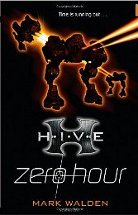Zero hour by Mark Walden

Bloomsbury, 2010. ISBN 978 14088 00164.
(Suggested reading age 10+) Zero hour is sixth in the Hive
series which
will appeal to younger readers, especially boys who appreciate fast
paced action. The plot is familiar, employing an evil megalomaniac who
seeks nothing short of world domination, resisted by a group of
courageous and intelligent teenagers who have only one chance to stop him.
Overlord is the villain in the tale and he has or rather is, artificial
intelligence which takes over other people, using their bodies as hosts
which do his bidding. When Overlord captures some revolutionary
armoured combat machines called 'Goliath' from the American Government
and takes critical international figures hostage, the HIVE school led
by Nero becomes involved.
Amazingly, amongst the frenetic pace, the author manages to weave
teenage attraction and affection into the story. The male characters
are appropriately awkward and embarrassed by the romantic developments,
ensuring that young male readers will not be put off!
Infiltrated via a dastardly plan, the students at HIVE must flee from
Overlord and his forces who seek to destroy all except Otto Malpense
who has a computer assisted brain. It appears that Otto in previous
stories had been created as a receptacle for Overlord yet was saved and
attends HIVE to use his powers for good rather than evil.
Led by Nero, the group set out to find Overlord and destroy him, yet a
series of betrayals lead to elements of the group being captured and
held hostage.
The remaining HIVE members are aware that their comrades will be killed
and that Overlord will control the world's armaments unless he is
defeated. The group must pool their special powers and intelligence in
a bid to rescue their friends and overcome an enemy who has no morals
and is incapable of showing mercy.
Mark Walden uses humour, action, technology and excitement in this
story which will enthrall young readers as it gallops along. The story
will especially appeal to readers who dislike stories which develop
slowly, employ more complex scene setting, detailed characterization or
introductory preamble.
Rob Welsh